Georges de Nantes.
The Mystical Doctor of the Catholic Faith.
3. A YOUNG MAN OF FRANCE
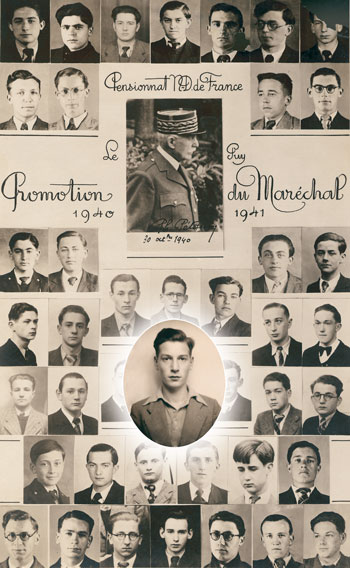 YOUNG Georges de Nantes did not see the war since he was in a boarding school at Le Puy. In June 1940, however, his parents insisted that he and his brother not leave the boarding school, which had been transformed into a military hospital, in order to avoid supporting the national rout. This is where he saw the waves of refugees, “ this teeming crowd from the corpse of a decomposing France. ”
YOUNG Georges de Nantes did not see the war since he was in a boarding school at Le Puy. In June 1940, however, his parents insisted that he and his brother not leave the boarding school, which had been transformed into a military hospital, in order to avoid supporting the national rout. This is where he saw the waves of refugees, “ this teeming crowd from the corpse of a decomposing France. ”
With his brother, he lent them assistance in order to marshal and direct them to the different reception centres, then he helped the Brothers to serve thousands of meals. “ It was in this basement, where a wireless had been installed, that I heard the voice of Marshal Pétain announcing that he had started negotiations with the enemy, ‘ among soldiers and in honour ’ for an end to hostilities and the signing of an armistice. I broke into tears and was afraid of dropping the plates I was carrying, whilst these poor people, dead tired, their families dispersed, and having lost all, applauded. Yes, they clapped their hands endlessly at hearing this broken, emotional voice of a suddenly venerated leader who understood the general misery and was announcing an end to the nightmare. ” 1
The flow of refugees abruptly halted. The pupils came back and took their exams. Georges de Nantes passed them successfully.
The beginning of the new school year in 1940 brought a surprise ! The brothers were wearing their habits again 2 : “ They had grown in stature in our eyes, and at every moment and in every place, they radiated their vocation and the depth of their souls. Thereafter, it could not be said that everything was the same. Everything was different. ”
Patriotism, religion, family feeling, these true blessings were restored thanks to the Marshal and the National Revolution. That is why our young student of elementary mathematics took the initiative, in agreement with the Brothers and his friends, of asking Marshal Pétain to be the patron of their class. The request was accepted : “ From the Hôtel du Parc at Vichy we received the requested authorisation together with a signed photograph. ” 3
THE HEROIC OLD MAN DEDICATED TO OUR SALVATION.
All of France melted with gratitude and love for the head of the French State ; this is what his journeys through France clearly demonstrated. On March 2, 1941, he came on an official visit to Le Puy :
“ On that day the whole district of Le Velay was in town, all Le Puy was on the streets ; the people were gravely awaiting the event. On the ninth stroke of nine o’clock, shouts were raised from near the station : ‘ Vive Pétain ! Vive Pétain ! ’and were being taken up, wave after wave, until they reached Le Breuil and then the Place de la Prefecture, thick with people, whilst amplified over loudspeakers the patriotic hymns and songs being sung by the major seminary could be heard from the summit of Mount Corneille, with its statue of Our Lady, that overlooks Le Puy. The Marshal’s speech was punctuated by the most fervent applause. There followed a long wait outside while he met the dignitaries of Le Puy.
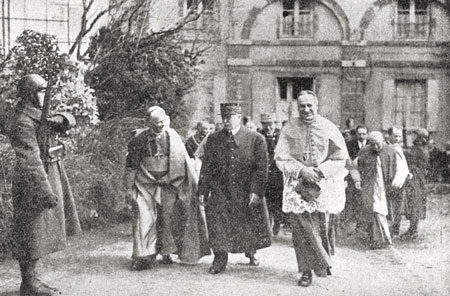
“ Then, there he is, only three metres away from us, and we can hardly stand up against the crowd pressing forward against us. He gets into a car, and I can see him behind the window suddenly looking very weary, his face as pale as marble. I weep – what else could one do ? Heroic old man, dedicated to our salvation ! He is going. The crowd rushes forward, breaking through the fragile barriers : an entire people surges through the streets and alleyways to the Cathedral where the Head of State is to attend High Mass. France, thousand year-old Catholic France, is there at the feet of Notre Dame du Puy, and the voices of all the bishops, university professors, local government prefects, all the writers and all the journalists proclaim with Cardinal Gerlier – because it is quite obvious and good : France is Pétain, and Pétain is France. With the Marshal, the country will be reborn. ‘ Maréchal, Maréchal, nous voilà ! ’ We are here with you !
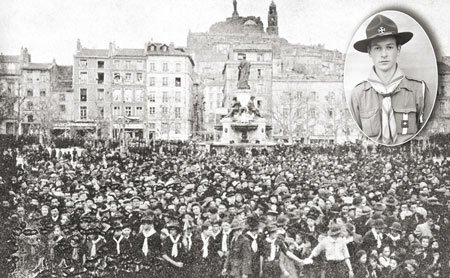
“ The next day, the schedule was back to normal. Morning Mass, trigonometry, gymnastics... There was no doubt that we got down to it with a much better heart that day ! ” 4
In June, Georges de Nantes sat for the exams for his graduation certificate (baccalaureate) and his father made him wait two years before allowing him to enter the seminary. The first year would be devoted to the study of philosophy at university, the other to work in the Youth Work Camps (Chantiers de Jeunesse). He exulted.
LYON : 1941-1942.
In Lyon, Georges de Nantes lived with his Uncle Edmond de Nantes and attended the classes of philosophy at the Catholic Faculty. The only thing that he retained from this year, which was difficult even in unoccupied France where supplies were rationed – he lost seven kilogrammes during the winter –, was “ an overwhelming feeling of mediocrity; ” his own, he admitted, but also that of his people. “ Our philosophy classes placed us outside of time. They were free of any allusions to world affairs [...]. The world of the Catholic University was impregnated with rallying to the Republic and to democracy. The national Revolution appeared in no way bound to find a place in its philosophy. ” 5
It was disengagement in the political sphere and “ mystical ” experiences in the religious sphere. One day, Georges de Nantes discovered “ another world ”, which he had already glimpsed with the “ Cordée ” of Le Puy, charismatics before the term existed: the world of the Companions of St. Francis, in whom he admired the intense fraternal charity mixed with a formidable spirit of subversion. It was the dream of a friendship stripped of all that forms a real part of destiny, but full of all the illusions, all the passions and desires sublimated by Catholic Action :
“ We celebrated Twelfth Night at the home of one of the Companions in Fourvière. On arrival, there was embracing all round with great gaiety. It is there that I heard the marvellous songs of Joseph Folliet, their founder, such as the incomparable :
O frere, gentil frere, quand mourut-il.... d’amour, quand mourut-il ?
Oh brother, gentle brother, when did he die... of love, when did he die ?
“ One would be at the piano, others would talk about the next pilgrimage, others would be getting to know people or looking after children. I retain a vivid impression of this simple, sincere, expansive, and conquering friendship. To them all, as I clearly saw, it seemed as though with such love in one’s heart there could no longer be problems between couples, social classes, races or in international politics. Pacifism and non-violence flowed naturally from their Franciscan spirit. Their generous and expansive joy made a deep impression on me, who was their secret enemy [although he was as yet unaware of it !]. Yes, indeed ! I was in a hotbed of resurgent Christian democracy and these charming companions were all those frightful Sillonists and red Christians only recently denounced by Action Française ! With these benumbed thoughts at the back of my mind, however, I still admired and wanted to share in the joy of my new companions, their mutual devotion and their sentiment of a possible universal peace. ” 6
This plunge into the Catholic left born of Catholic Action threatened to take him to the furthest remove from his family inheritance and his vocation, when “ grace circumvented me and seized me from without, thus saving me. Ex opere operato. It means: by the simple fact that I received this Sacrament [of the Eucharist] every day. This series of divine dispositions, my embarrassed attitudes, the discreet observations of my uncle, the fears of my parents, and the gentle irony of Fr. Tarcisius [ his director of conscience ] regarding my most cherished illusions were followed in the end by this letter from Papa advising me to anticipate my call-up for the next year and enlist for the nine months in the Youth Work Camps that had by then replaced military service. It was the work of God ! Before the harm went too far He had, through His incomprehensible and boundless mercy, disposed all things for my good. Ex opere operato.
“ No sooner had Papa’s letter come than with all my soul I was absolutely sure that that was the direction I had to take and, filled with joy, as though inspired by the Holy Spirit, I exclaimed : ‘ Oh yes, that is what I must decide to do this very day. And long live Papa ! ’
“ This docility came from my profound detachment from everything, from my attachment to my vocation alone, to Jesus alone. It was ex opere operato, the natural, normal, unconscious but saving fruit, quid pro quo, of daily Mass. ” 7
He learned a lesson from this for life. Thus he was saved from the worst and from the Mediocrity that reigned at Lyon in 1942, in contrast to the fine ideal that the Work Camps were contemporaneously instilling in the youth of France.
Georges de Nantes belonged to the class of ’44 and it was now 1942. He thus had to anticipate his call-up. He made the request and had an interview with the head of recruitment, Ballot, who understood him perfectly. This man “ of enlightened patriotism, of fervent Catholicism, ” spoke to his “ young visitor ” about a France that was sick because of secularism. Even more than faraway countries, she “ needed apostles with fire in their souls. ” Georges de Nantes, “ keenly attentive, ” listened : “ Thus the authority of the Government, as I could see with my own eyes, wanted to make the new France a land of Christendom. It was exhilarating. ” 8
Our Father fully accepted this mission and fifteen years later, when he wrote our Rule, he made it the specificity of our missionary order:
“ Hermitages will be founded first in Christian lands and then in infidel lands, principally those that France assumed the task of civilising, and always in such a way that they mutually support one another. ” (Art. 115)
YOUTH WORK CAMPS : 1942-1943.
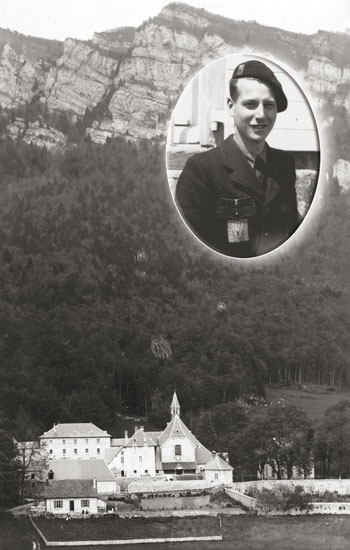
The head of the French Youth enlisted him, promising him that he would have a rough time of it, and indeed he did ! He savoured intensely, however the “ pure, simple, honest, strongly patriotic ” atmosphere “ without pathos ” that prevailed in the camps. “ It was there that I began to learn to work hard, to maintain and always clean my tools, in a word, to become a man. Discipline was broad, the ceremony of the colours gave its meaning to our young life as French Youth, and the ‘ forest green ’ uniform contributed to fraternising among the social classes, where the vigorous, simple, country element was still dominant. ” 9
“ A Trade without Cheating ” : this is how he entitled the chapters of Memoirs and Anecdotes devoted to the fourteen months spent in the Work Camps. It was an ideal of a hard, disciplined, but honest and true life, protected and defended by enlightened legitimate and respected authorities, with unfailing loyalty to the Marshal. He lived this life and saw it lived remote from the world, embodied by young men of all ranks working for the common good. The newfound order that he felt threatened on the one side by intellectuals – such as those of the École des cadres whom he had glimpsed while in Uriage 10 during a stagecraft course. They were “ parasites of the new State, ” already preparing their return to the party regime. On the other side the newfound order was threatened by the members of the Resistance, seen at close quarters in the Vercors, “ cowardly criminal bands with neither faith nor law. ”
For the first time in his life, he was almost without the sacraments, but with his one-decade Scout rosary on his thumb and contemplation of nature in the Vercors Massif, he experienced the loving presence of the Creative Word :
“ To the Christian, nature speaks. This rain is also God’s Word, every little drop that hits you and trickles down your neck [...]. It is impressive when you realise that you are all alone in your rainy cloister, manipulating your billhook that slithers down the trunk from which you are stripping the branches. Everything is slippery, drenched, dripping wet. This rain, however, whispers to you, poor soul, its message of compunction : carry your cross daily, My son, for that is how you prove yourself to be My disciple, and I shall give you a share in My Kingdom. The wood says it to the billhook, and the stream sings it to the rock.
“ With the coming of October, the hoar frost succeeded the rain [...]. When I worked with frozen, numb fingers and aching feet, suffering from this hostile cold that trickled with splendour all the same, then it spoke to me as a gospel of pure glory and of mortifying pain. The same good God gave with one hand what He took with the other, joy for pain, piercing cold in still beauty. Oh divine Hand that both wounds and comforts ! For me, never has the substance of nature’s beings spoken so clearly, so variously or so amply as it did then, when it spoke the language of God, of the I-AM of the Bible, to which the JESUS in me responded. ” 11
In the Work Camps he once again found all that he loved : “ In this, the third summer of world war, everything was in perfect harmony for us, at least for me it was : my devotion to Christ and Our Lady, my vocation as a monk-missionary and the protective presence over us of Maréchal Petain and of General de La Porte du Theil, our commissioner general and founder of the Camps, who guaranteed us our daily bread, even if it was mouldy. More than that, they guaranteed us peace and freedom in a Europe at war or in slavery... Added to these great benefits was that ‘tremendous’ comradeship that immersed me in the people of those times, whom defeat had subdued but which also freed, exorcised them from their anticlerical and revolutionary demons... ” 12
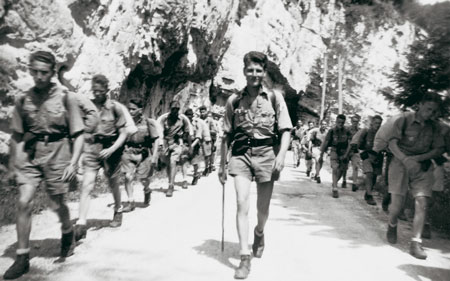
He learned how to lead men. He was designated to attend a foremen training course and liked its organisation. Each morning of the course was taken up with classes on the history of France, the life of the Marshal and of General de La Porte du Theil, and the Work Camps, morality ; in the afternoons, there was physical training and practical work. Every morning and evening, there was the hoisting and lowering of the Colours. “ The flag flutters in the sky [...]. In the grandeur of nature, of the ceremony, and of our willing and proud discipline, there was the unforgettable cult of France – this feminine soul, this gentleness, this order – and also a salute to her Chief, without whom our poor human lives would have been truly lost ! I filled my heart and my senses with this potent fragrance of France that I want never to forget. ” 13
It was in the Bois-Barbu camp, where he was foreman, that he learned on November 8, 1942 that the Allies had debarked in North Africa, to the great joy of everyone, then the invasion of the unoccupied zone by the Germans. The Marshal’s instructions, transmitted through only two intermediaries were precise : prudence and absolute discipline. The liberation of the Empire and then of Metropolitan France had begun.
During Christmas night 1942, he wept with emotion with many of his friends at the Marshal’s message : “ In this night when the rudest of men find that they have the heart of a child to believe and to love... ” 14 In January 1943, he was appointed to a forestry camp at Valchevrière for the felling of coniferous trees. The work was carried out with glee! “ France was restoring a strong and healthy youth in the great outdoors. They were courageous at work and marked with true camaraderie. ” 15 Valchevrière was not the “ slavery ” of Petouze ! “ What a fine life was that of the Work Camps, ” that received boys who were often immature and made men out of them !
During the following summer, he wanted to enlist for “ a mission that was certainly perilous, but of the greatest moral and patriotic importance ” : supervision of the group of young men who had been designated to go to Germany for the forced labour instituted in France by the Nazis during World War II. At the same moment, however, a letter from his father arrived reminding him that the waiting period of two years before entering the seminary had expired ; he was henceforth free to respond to his vocation if it still held firm. In that case, he would have to resign from the Labour Camps and clarify his administrative situation for the opening in October. It would have to be in Paris since, due to the war, the noviciate of the Brothers of Father de Foucauld and the French Seminary of Rome were inaccessible.
“ It was Dad’s writing, but is was certainly the voice of my heavenly Father. There was no need to reflect on it. ” 16
He tendered his resignation and it was accepted. The last months passed quickly. In August, a big celebration gathered together the two thousand young men of the Vercors for an athletic competition, theatrical performances and a parade with a decoration ceremony. It all ended with an immense campfire during which Georges de Nantes acted as the master of ceremonies. It was a splendid day. “ Yet for the Work Camps themselves, it was their swan song. Their last celebration, their glory was suddenly engulfed in this black storm of 1944 that would sweep everything away, disperse and ruin all [...]. I then made an offering to Christ of this beautiful country, of this camp, of these men so as never to forget them, although I was leaving them forever. ” 17
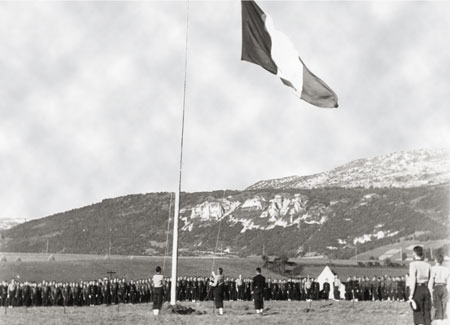
The last field day of Group XI on the plain of Autrans.
He tore himself away from the service of the country in a tragic hour, for the unique service of God for which he conceived the highest esteem. 18
(1) Memoirs and Anecdotes, Vol. I, pp. 216-217, published in CCR no. 169, July 1984, pp. 21-23.
(2) At the beginning of the 20th century, successive anti-clerical governments of the French Third Republic persecuted the Catholic Church. In 1901 the Waldeck-Rousseau government forced each Catholic religious order to apply for legal authorisation and no member of an unauthorised order was allowed teach. In 1902 the new administration of Emil Combes ( a former seminarian who had become an atheist and a resolute opponent of religion ) applied the 1901 law ruthlessly and the applications for legal authorisation were refused globally. 81 congregations of women and 54 of men were dissolved. By 1903 over 14,000 schools run by unauthorised orders were closed. In 1904 members of religious orders were forbidden to teach. Almost all religious orders were banned. As many as 60,000 priests and nuns were exiled.
The Institute of the Brothers of the Christian schools was among the orders that were banned in 1904. 4000 brothers were exiled. In 1914, however, most of them came back to France to answer the call to arms. 260 were killed in action during the war. Many of those who survived remained in France and founded schools. Since they remain officially secularised, therefore wearing no religious habit, their schools were tolerated by the following governments.
When Marshal Pétain became the French Head of State, his policies in favour of the Catholic Church prompted the Christian Brothers to start wearing once again their distinctive religious habit.
(3) Ibid., pp. 219-220, published in CCR n° 169, July 1984, pp. 21-23.
(4) Ibid., p. 221, published in CCR n° 169, July 1984, pp. 21-23.
(5) Ibid., p. 288, published in CCR n° 181, July 1985.
(6) Ibid., pp. 268-269, published in CCR n° 174, December 1984, pp. 17-19.
(7) Ibid., pp. 278-279, published in CCR n° 144, January 1985, pp. 11-13.
(8) Ibid., pp. 283-284, published in CCR n° 177, March 1985, pp. 21-22.
(9) Ibid., p. 361, published in CCR n° 198, Feb-March 1987, pp. 13-15.
(10) The École des cadres in Uriage was a institution created under the French State of Marshal Pétain by Captain Pierre Dunoyer de Segonzac in September 1940. It was originally intended to form a new French elite within the framework of the Marshal’s Nation Revolution. The spirit that prevailed there, however, was so far removed from that of the National Revolution, that the Vichy government officially closed it in 1942. Here is what our Father wrote about it in his Memoirs and Anecdotes : “ I imagined that up there in the chateau of the ducs de Lesdiguières, the École des cadres was one of those places where the spirit blows and that I was lucky to be at one of the authorised sources of the National Revolution’s mystique. I made a few incursions into the chateau although we were plainly made to feel that we had nothing to do with it. On the last day, however, we were invited in just as the chateau salon is open once a year to the local peasants and lower servants. It was certainly intimidating, but whether it was dazzling I am not so sure. I remember the immense portrait of Dunoyer de Segonzac, the great man of those places, the “ Old Leader, ” in the entrance hall. It made an impression, but a bad one. I only knew one old leader, and that was the Marshal who had “ made a gift of his person to France in order to attenuate the evil. ” And here was this unknown braggart, devotion to whom was imposed on all comers ! I observed that this “ mystique du chef ” was cultivated in a way that I had never met anywhere else, and certainly not at the Work Camps, neither for the General ( General de La Porte du Theil, the commissioner general and founder of the Youth Work Camps ) nor even for the Marshal. It was overdone and all the more ridiculous in that the instructors, especially the intellectuals in civilian dress whom we met there, seemed to share in the invisible magnetism of the Master themselves, which was inaccessible to us, and thus they too became great leaders ! From the advertised lecture programme, from the printed matter on display and from the talks given by these professors I could smell a whiff of the JEC movement and of Christian democracy far removed from the idea I had formed of the National Revolution. I came away from there feeling uneasy, too young to be indignant, at the idea that hidden away in that chateau were parasites of the new State, intellectuals who were alien if not already rebellious towards it, awaiting and preparing for the return to parties, to parliamentarianism and to the republic. ”
(11) Ibid., pp. 386-388, published in CCR n° 206, January 1988, pp. 16-18.
(12) Ibid., p. 368, published in CCR n° 199, May 1987, pp. 23-25.
(13) Ibid., p. 369, published in CCR n° 199, May 1987, pp. 23-25.
(14) Ibid., p. 395, published in CCR n° 144, April 1988, pp. 17-19.
(15) Ibid., p. 405.
(16) Ibid., p. 414.
(17) Ibid., pp. 414-415.
(18) CRC n° 6 (suppl.), March 1968, p. 17.